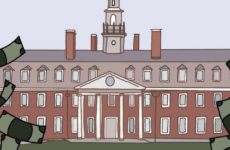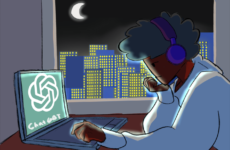Perhaps the worst part of feminism is its prefix, “fem.” The inherently female nature of the word often scares us, and it insinuates a fundamental exclusion of male perspective. At Choate, there is an unspoken understanding that feminism is limited to females. In our warm bubble filled with Diversity Day discussions and social justice clubs, the issue is not that we do not discuss feminism — the issue is that somewhere along the line, as a campus and as a community, we have made feminist issues synonymous with women’s issues. The problem with this false analogy is that it only fuels the misconception that the movement opposes men.
On campus, this misconception means that we are silencing conversation about how the patriarchy hurts men as well as women. On a large scale, this means we easily forget that men also experience issues like rape, sexual assault, or suicide and depression, as these are topics we typically and comfortably associate with women. From a more immediate perspective, this also means we forget that guys feel a pressure to conform to gender norms, too; while these are vastly different from the gender roles girls conform to, they are no less damaging.
To be a community that truly values diversity, we must take a look at the patriarchy through the lenses of all genders. Just as girls are expected to subscribe to certain expectations, so too are guys. Just as a junior girl on campus is expected to be chased, her junior male counterpart is (in most social circles) expected to chase. We see this hyper-masculinity manifest itself in different realms on campus, whether on a sports field, in a dorm, with friends in the dining hall, or with a girl over Snapchat. There are certain roles that are expected of each of us, and we all play our part; yet when it comes to discussing gender roles and issues, we persistently hear from only one gender.
No matter what group of people — male, female, or nonbinary — a certain issue pertains to, the likelihood of solving it through an exclusive discussion with only one demographic voicing its dissatisfaction is slim. As with anything else, a solution warrants compromise and collaboration. Yet meetings for clubs like Students Advocating for Gender Equality (SAGE) consistently draw a crowd of liberal, female, self-proclaimed feminists. Although these members are helpful in sharing the knowledge they’ve gained from free hours spent examining online articles at everydayfeminism.com, meetings often end up being a reinforcement of already-realized ideology. Males who do attend are also the few expected representatives of male feminism on campus.
Like many topics on campus, feminism has been restricted to a single perspective. Feminism, however, has its roots in resisting female oppression and thus should seek to recognize all voices that have been silenced. In order to persist on our modern-day campus and in a modern-day world, it is essential to extend the intersectionality of the movement towards men as well. On campus, male students should feel comfortable acknowledging their struggles with gender stereotypes, just as female students often do.
In order to solve problems that pertain to all genders, students of all genders must step up to acknowledge their own role in both perpetuating and falling victim to existing norms. It is often said that girls feel pressure on campus, whether it is to dress or act a certain way or to participate in hookup culture. What we must examine next are the pressures boys at Choate face, in regards to hookup culture and beyond, and how these pressures compare and contrast with those faced by girls; only then can we begin to deconstruct the hyper-masculine expectations that affect so many students on this campus. We must do this by reminding ourselves that the dominant liberal point of view is neither the only nor the best point of view on campus. We must make spaces dedicated to inclusion truly inclusive, and above all, we must strive to reach a point of which people of all genders can openly discuss their experiences at Choate without fear of ridicule or rejection. As always, the task of becoming a more empathetic and inclusive community is ongoing, ever-changing, and ever-challenging.




